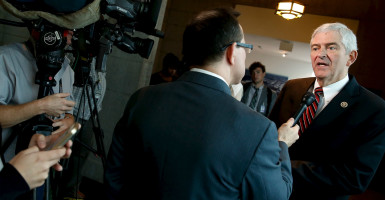The House Freedom Caucus is standing by its man.
After Majority Leader Kevin McCarthy, once the leading man to become speaker of the House, abruptly dropped out of the race Thursday, the 40 or so conservative members of the Freedom Caucus said they will continue to endorse Rep. Daniel Webster of Florida to ascend to the top spot.
“We stand by our support of Webster,” said Rep. Justin Amash, a Freedom Caucus founder. “He would make a fantastic speaker. As a group we endorsed Webster, and we stand by the endorsement.”
Amash, R-Mich., spoke to The Daily Signal as he emerged from a meeting among Freedom Caucus members after lawmakers learned McCarthy is no longer a candidate in the speaker race.
He said there was no discussion about having one of the group’s own members run for speaker.
In an interview with The Daily Signal, Rep. Jim Jordan of Ohio, chairman of the Freedom Caucus, confirmed that the group is going to continue supporting Webster for speaker. Jordan said he hopes Webster’s candidacy sparks a larger discussion in the Republican conference about creating a more open legislative process.
“Our focus is on making sure that the next speaker will put in place the changes that will help us do what we told the American people we were going to do,” Jordan said. “And that’s what we’re focused on. Plain and simple.”
Webster was considered the underdog. But after the Freedom Caucus announced Wednesday it would throw its support behind him, the likelihood of McCarthy’s collecting 218 votes diminished.
“We’re looking for a speaker who is going to run the House of Representatives according to the rules,” Rep. Marlin Stutzman, a Freedom Caucus member from Indiana, told The Daily Signal. “And we felt very comfortable with Daniel Webster, with his former experience in Florida and his discussion with us in our meeting, that he would be the one best suited to run the House of Representatives.”
Rep. Steve King, R-Iowa, nominated Webster for speaker in January, when he received the second highest number of votes behind Boehner. Today, King said Webster’s pitch to Republicans has gotten the attention of many colleagues.
“[Webster] has made a powerful case for overhauling the function of the House and making it principle-driven rather than power-driven, and that appeals to a lot of members who have been, I’ll say, disenfranchised from the power-driven House that we’ve experienced,” King told reporters.
In an interview with The Daily Signal last week, Webster lamented the current “power system” of House leadership, one where committee chairmen and senior members receive preference for their legislation.
Speaking to reporters today, Webster said he was “99 percent sure” McCarthy was going to win the support of the majority of the Republican conference. Although McCarthy dropped out—leaving only Webster and Rep. Jason Chaffetz of Utah in the running for now—Webster still wasn’t convinced he’s the favorite.
Even so, the Florida Republican stood by his promise to Republicans regarding what he can offer as their leader.
“All we have to do is base things on principles, include the membership, and take up the most important issues first,” Webster told reporters:
When you roll out the 12 appropriation bills now to the Senate, all of them, it puts a lot of pressure on the Senate, it puts a lot of pressure on the president. But if we don’t get that done and we only do a few of them, it makes them in charge. The closer we get to a deadline, the less authority the House is going to have.
Before he could be formally nominated, McCarthy stood up before his Republican colleagues in a closed-door meeting and took his name out of the running for speaker. His announcement shocked Republicans, many of whom contended that although McCarthy may not have had the 218 votes needed to win the speakership, he did have broad support in the conference.





























